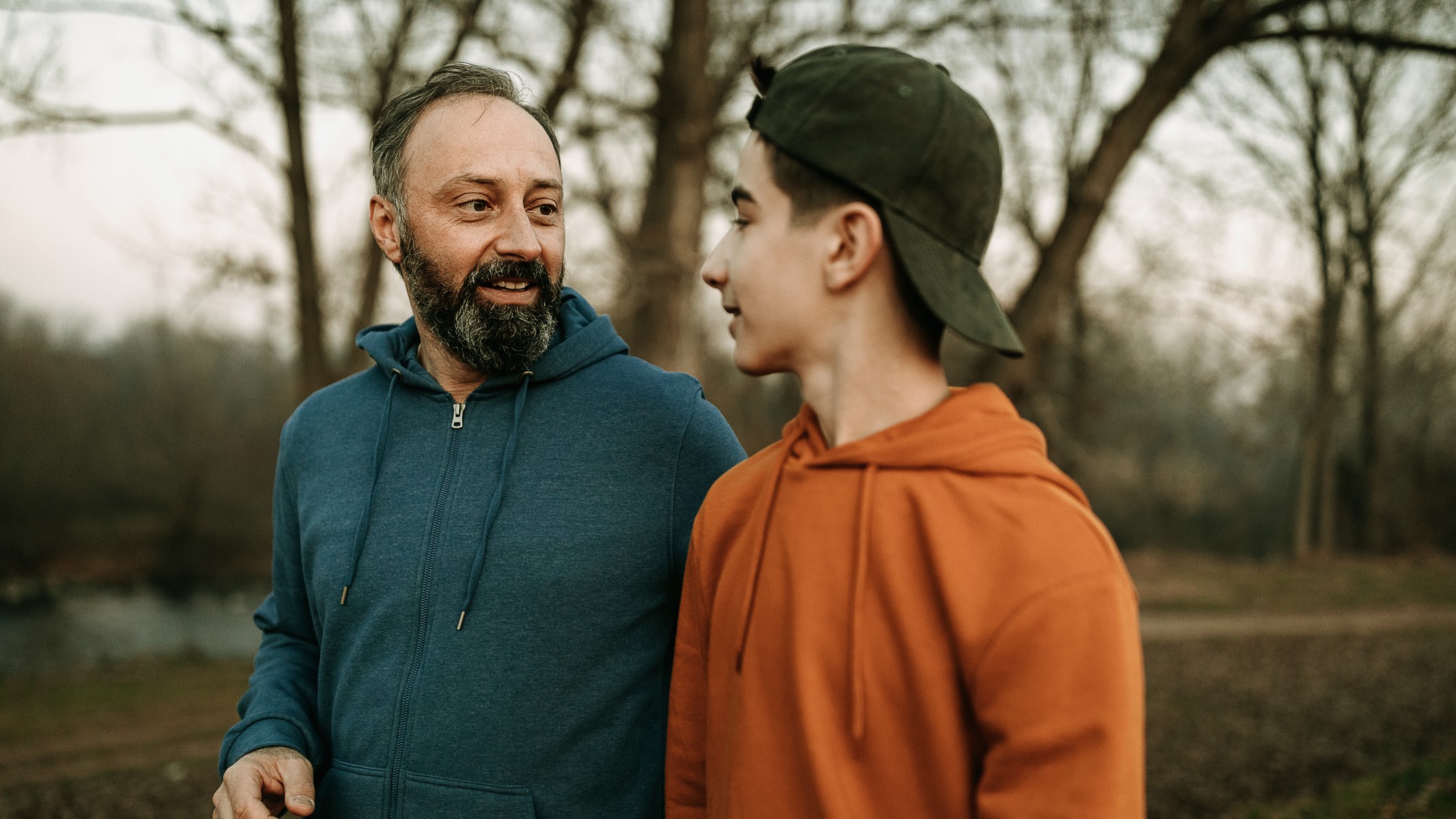
Talking to your kids about pornography? Yep, it's as awkward as it sounds. Many of us grew up with euphemisms for body parts and hushed tones around sex, making this kind of cycle-breaking conversation feel super daunting.
However, with most kids having smartphones from an early age and accessing content on social media, it’s never been more crucial to talk to kids about porn. We’ve got expert guidance on navigating these conversations with your children, regardless of their gender identity or sexual orientation.
This is one convo I dread having. But actually, if you think about putting it in the same context as safe sex, online safety or cyberbullying, why wouldn't we talk to our kids in the same way, in order for them to have healthy and happy sex lives? While I'm still not looking forward to the inevitable questions, I feel ready to tackle the opening lines.
If you need more help with other awkward topics, we’ve also got guidance on how to talk to your kids about sex, how to talk to kids about coming out as gay, lesbian or bisexual and advice on why you shouldn't tease your child about having a ‘boyfriend’ or ‘girlfriend’ (it can actually harm their development).
We'll cover what to say, how to say it, and when to broach different topics to ensure your kids stay safe and informed. From understanding consent to recognising heteronormative and unrealistic portrayals of men's and women’s bodies, we'll help you equip your children with the knowledge they need to navigate the complex world of porn.
How to talk to kids about porn?
We need to talk to our kids about pornography in the same way we speak to them about sex. Explain to them that it's okay to be curious and have questions and that it's not real, and it can be scary and harmful for them to watch it. Also, being open, honest, and neutral and receptive to conversations and questions about the subject can help protect them further down the line. We all want them to have happy, healthy sex lives, so teaching them that pornography isn’t an accurate reflection of real-life sex is vital. We also need to give them the tools to say ‘no, thanks’ if someone offers to share porn with them.
Sexologist Sofie Roos points out that guiding your child around the subject of porn can protect them in the future from bad sexual experiences. “The risk that your kid will watch really hardcore porn the first time, and way too early, is considerable,” she says. “If you aren’t there to guide them, your kids' only sexual reference will be heavy porn which creates a big distance between their view of sex and sex in real life.”
When should I start the conversation around porn?
Earlier than you might think, given that the average age at which children first see pornography is 13. However, one in four kids have seen it by 11, and one in 10 have seen it by the age of 9. Nearly eight in 10 youngsters (79%) have encountered violent pornography depicting coercive, degrading or pain-inducing sex acts before turning 18. These disturbing statistics are from two reports: Ofcom’s 2022 report on Adult Users’ Attitudes to Age Verification on Adult Sites and the Children’s Commissioner report from the same year: Online Safety Commission from Government: Our Recommendations for Making the Online World Safer for Children.
And if you think there’s no chance your child can access pornography from their tablet or smartphone, think again. The Children's Commissioner report found that Twitter was the online platform where most young people were most likely to see pornography, followed by Instagram and Snapchat - places where many children first start to set up their social media accounts and connect with friends.
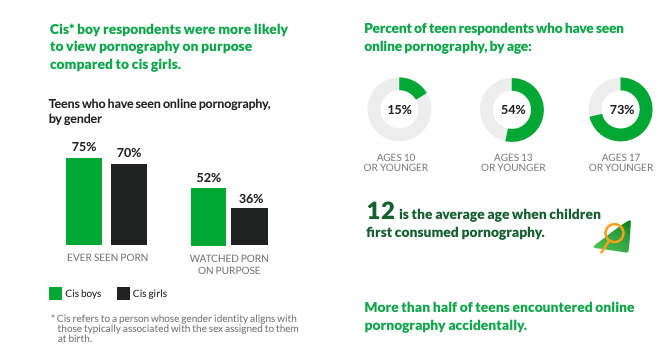
So, the sooner we start talking to our children about pornography, the better. “I tell parents to start three years before they think their child will need the information,” says victim advocate and student safety expert Carrie Pasquarello. “It's a lot easier to have a conversation about prevention than it's to have a harder conversation after a person is victimised. Unfortunately, kids are often only just one easy click or tap away from pornography. So, the conversation should start today.”
Clinical psychology and parenting expert Dr Martha agrees. “It’s likely your child will come across porn online, either on their own device or someone else’s. The first time a child sees porn is often completely accidental. It is best to address porn ahead of time, rather than after they have seen it, which can be distressing and scary for many children.”
Talking to kids about porn: Ages 5 - 11
Yes, okay - 5 might seem like a really early age, probably because no one ever talked to us about it, but the success lies in making the conversation age-appropriate. For example, you can tell your child that if they see someone naked on a screen or if they see anything that makes them feel scared or uncomfortable, they can tell you.
In a Children’s Commissioner guide on talking to your child about online sexual harassment, 16-21-year-olds were asked what they wish they had known earlier. One said, “I feel like the best time for parents to have a conversation about porn is a bit earlier for boys than girls. From my experience of male friends, they definitely see porn earlier than my female friends. I mean, like early: year 4, year 5, year 6.” Another said, “It shouldn’t be a taboo. It should be something that parents talk about to their kids.”
Here are some tips on talking with younger children about porn from our experts:
- Pick the right time: “Find a situation where you’re both comfortable,” says Sofie. “Bringing it up during a car ride is great because then you don’t have to have eye contact and can easily switch focus to the radio if it becomes too uncomfortable.”
- Be open about the fact that people have sex for pleasure: “Don’t be afraid to say it’s about pleasure, not only to make babies,” says Sofie. “If you say it’s only about making babies, there’s a big risk that your kids will reject all the other advice you gave them as false as soon as they realise that sex is mostly about pleasure!”
- Talk about consent: It’s important to raise this as soon as you think your child will understand, says Sofie. “Consent is never highlighted in porn, and often non-consensual sex is the actual theme of the content. This can lead to big problems with your kid's view on consent. But the sooner they understand it, the deeper respect your kid will have for other people’s will and consent during intimate moments.”
- Don’t overreact: “If your child sees porn and comes to talk about it to you, the first thing to do is to thank them and check in on how they are feeling,” says Dr Martha. “Don’t shame or reprimand a child who has seen porn and is openly wanting to talk about it. Get curious about what they think they saw and how they came to see it.”
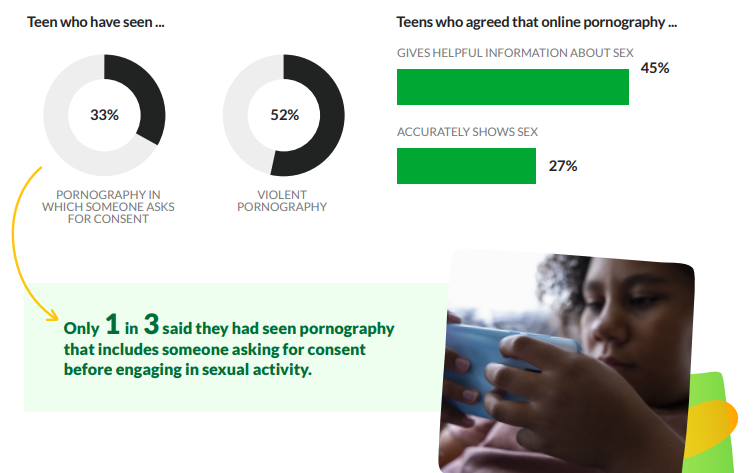
- Explain how porn isn’t real: Dr Martha stresses that kids can get upset or scared the first time they see porn, so it’s essential to use that moment to explain how porn isn’t real and is created for adults. She suggests saying something like: “Porn films are not real; they are actors and actresses who are not in loving relationships. Sometimes, these videos and images pop up when you search for something, which might surprise or upset you. You might be curious to see more, and that's normal, but it might not be safe for you to see it because it was created for adults, not children.
- Let them know what to do next: It’s important to remember that the first time your child sees porn won’t be the last, so give your child the words and actions for the next time they encounter it. Dr Martha suggests telling them something along these lines. “When this happens, you can shut the phone/laptop, or if someone else is showing you, you can tell them ‘I don’t want to see it, it’s fake’.”
- Let them know you are there whenever they want to talk: Remind your child that you’re there to answer any questions they have and that they will never get into trouble for accidentally watching porn.
Talking to kids about porn: ages 11+
As your child gets older, the risk of them seeing pornography increases, so if you haven’t already talked about it, now’s the time to do so.
It’s also a period in which your child is starting to have more thoughts and feelings about their bodies, gender identity and sexual orientation, so it’s important to remind them that porn is created mainly for a male audience and that the sexual encounters in porn aren’t reflective of all the sexual encounters that people have in the real world.
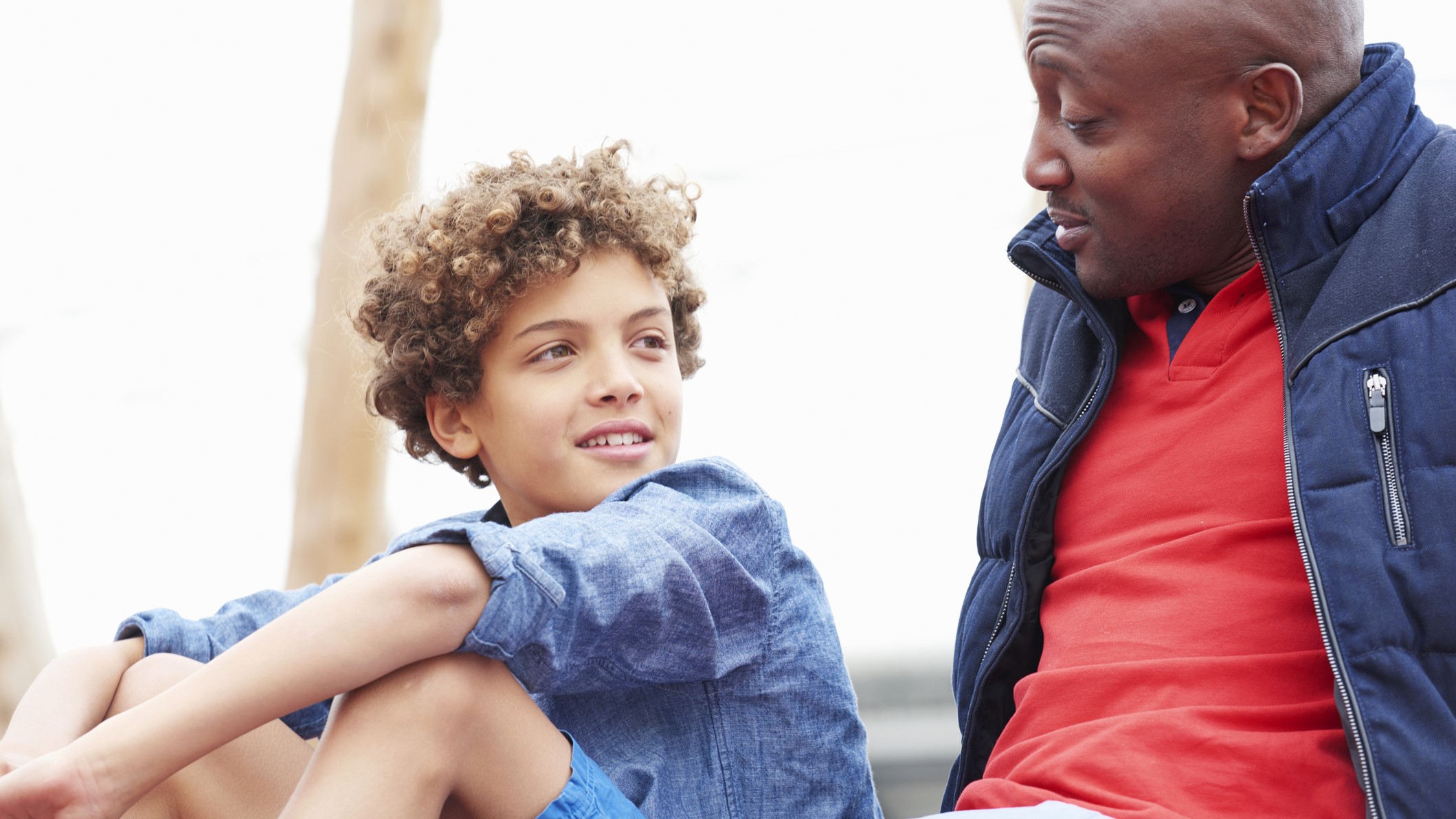
Consent starts to loom large in this age group, too, and you can be more explicit about consent and respect for other people’s bodies in your conversations.
Here are some tips on talking with older children and teens about porn from our experts:
- Respect their privacy: Avoid opening conversations with ‘Have you ever watched porn?’, suggests Sofie. “It’s important to remember that porn is really private, so always avoid asking direct questions!”
- Be more specific about real sex: “Many kids at this age will hear things like ‘porn is not like sex in real life’, but people never say how it’s actually different.” She suggests describing how sex can be different between two people in real life. For example, you can use your own experience of exploring sex for the first time and how you realised it was different from pornography because it was less noisy, for example, or more gentle.
- Be more explicit about violent sex and issues of consent: Older kids and teens are more at risk of re-enacting things they see in porn videos, so it’s important to let them know that acts such as choking, slapping, pulling hair, or nonconsensual sex are not acceptable in real-life encounters.
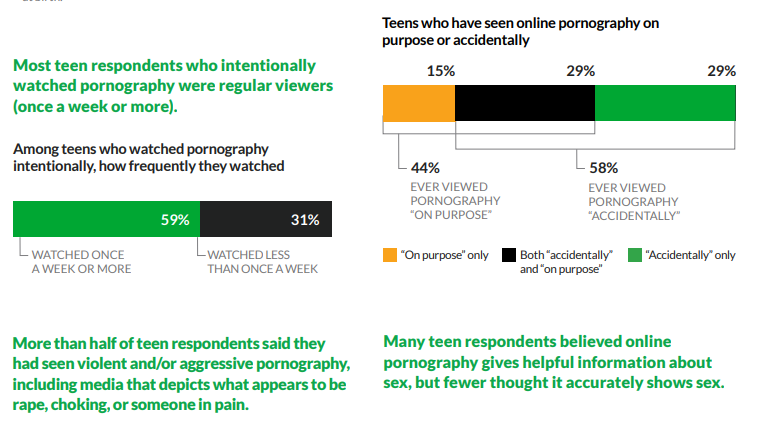
- Be open about sexual identity and gender: Any non-binary or LGBTQI+ teen seeing ‘mainstream’ porn may feel isolated and unseen. Psychotherapists and authors of the Sunday Times bestseller You’re Not the Problem: The Impact of Narcissism and Emotional Abuse and How to Heal, Katie McKenna and Helen Villiers, say it’s important to talk about this openly. “Explain about different sexual identities to normalise things such as being gay or asexual. Giving your children language to describe themselves empowers them. It allows them to feel ‘normal’ in a world where, as a teenager particularly, they will feel like the only person to experience their thoughts and feelings.”
- Think about why they’re watching porn: If you’re concerned that your teen is watching porn too regularly, there are conversation starters that you can try to see if there are any underlying issues. For example, do they feel unsure about real-life sexual experiences and are watching porn to get the information they think they need. If the answer is yes, you can point them to better sites that can show them exactly what they need to know (don’t worry - there’s a list at the end). If you’re worried that porn may have become an addiction for them, then ask them if they feel they can talk to you about it and how it makes them feel.
There’s always a chance you’ll get an eye-roll and a slamming door, but according to research from Common Sense Media, over half of teens who talk to a trusted adult about porn think about ways to explore their sexuality other than porn.
Helpful podcasts, sites and books
The following books, podcasts and websites can help you and your child start the conversation:
- Podcast: How to talk to your kids about porn
- Podcast: How To Talk About Porn and Sex With Your Tweens and Teens
- Website: Amaze - easy-to-understand videos answer kids' sex-ed questions.
- Website: Sex, Etc. - Smart sex-ed site puts spotlight on teen contributors.
- Website: Scarleteen - comprehensive and highly inclusive sex and relationships education.
- Book: In Case You're Curious: Questions About Sex from Young People with Answers from the Experts, by Planned Parenthood
Featured experts
If you struggle to connect with your teenager, here are 25 brilliant ways to open up a conversation with them, with plenty of advice from our experts. Plus, here are the five most important things you should talk to your teen about before they start dating, and what to do if your teenager is drawn to taking risks.







